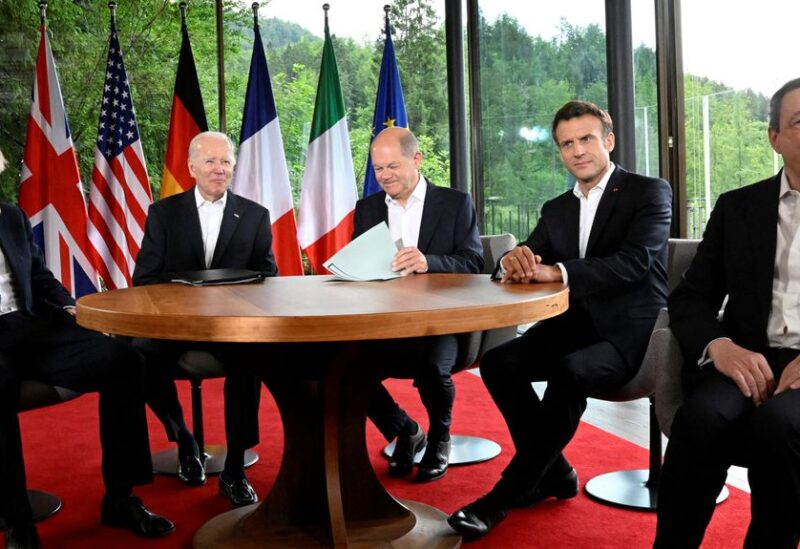
British Prime Minister Boris Johnson, U.S. President Joe Biden, German Chancellor Olaf Scholz, France's President Emmanuel Macron and Italy's Prime Minister Mario Draghi pose for a photo during a meeting alongside the G7 leaders summit at Bavaria's Schloss Elmau, near Garmisch-Partenkirchen, Germany June 28, 2022. Tobias Schwarz/Pool via REUTERS
This week, leaders of the Group of Seven wealthy democracies gathered for their annual three-day summit at an opulent castle resort in the southern German Bavarian Alps.
Here are some of the highlights on what the G7 agreed on Tuesday, the final day of the summit:
“We will explore further measures to prevent Russia from profiting from its war of aggression,” the G7 communique seen by Reuters said.
“We will further reduce reliance on civil nuclear and related goods from Russia, including working to assist countries seeking to diversity their supplies.”
“As for oil, we will consider a range of approaches, including options for a possible comprehensive prohibition of all services, which enable transportation for Russian seaborne crude oil and petroleum products globally, unless the oil is purchased at or below a price to be agreed in consultation with international partners.”
“We invite all likeminded countries to conside34r joining us in our actions,” the communique said.
“… we commit to end new direct public support for the international unabated fossil fuel energy sector by the end of 2022, except in limited circumstances clearly defined by each country consistent with a 1.5 degree Celsius warming limit and the goals of the Paris Agreement,” the G7 communique seen by Reuters said.
“In this context and with a view to accelerating the phase out of our dependency on Russian energy, we stress the important role increased deliveries of LNG can play, and acknowledge that investment in this sector is necessary in response to the current crisis.”
“In these exceptional circumstances, publicly supported investment in the gas sector can be appropriate as a temporary response …”
“We commit to achieving a fully or predominantly decarbonised power sector by 2035,” the communique said.
“We commit to an additional $4.5 billion to protect the most vulnerable from hunger and malnutrition, amounting to a total of over $14 billion as our joint commitment to global food security this year,” the G7 members said in a statement.
“We stand by our commitment to keep our food and agricultural markets open and call on all partners to avoid unjustified restrictive trade measures that increase market volatility and thus the risk of food insecurity.”
“We also commit to scaling up essential nutrition services in countries with the highest burden of malnutrition,” the statement said.